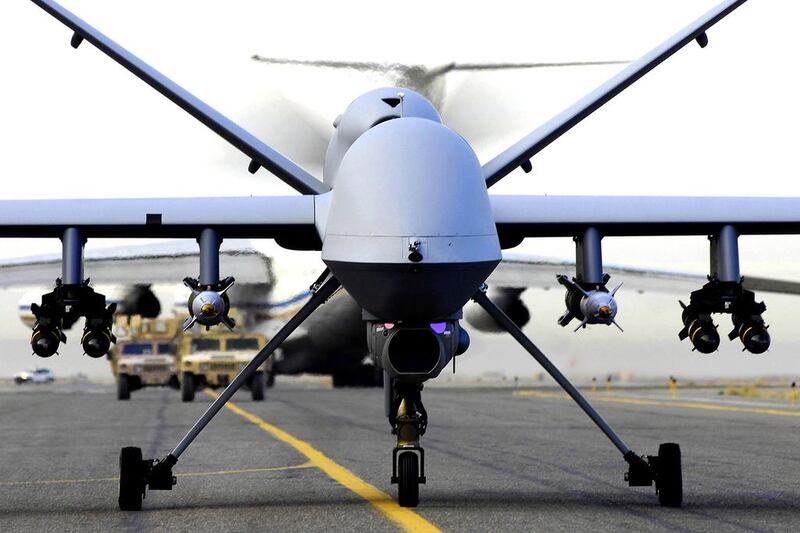NEW YORK // A group of nearly two dozen American members of Congress have written to Donald Trump asking him to approve sales of armed drones to the UAE and Jordan after the Obama administration blocked the move.
In a letter obtained by The National, they say the two Arab countries are key allies in the fight against ISIL and in thwarting growing Iranian influence in the region.
Although the UAE has taken delivery of an unarmed, export variant of the General Atomics Predator – becoming the first non-Nato country to fly the Predator XP – sales of the armed MQ-9 Reaper were not allowed under a non-binding international agreement designed to prevent the proliferation of drone and missile technology. There were also concerns within the Pentagon about sharing, even with a close partner, the military satellite technology used by the US-made drones.
The UAE was also apparently barred from buying an unarmed maritime model known as the Seaguardian.
Since taking power, however, Mr Trump has signalled a more relaxed approach, promising to be a better friend to partners in the Middle East as they help fight extremist groups.
In their letter, the 20 Republican and two Democrat members of the House of Representatives said the orders could be worth as much as US$1 billion (Dh3.67bn) to the economy, protecting American jobs as well as the country’s security. It was organised by Duncan Hunter, whose California district includes the headquarters of MQ-9 manufacturer General Atomics.
“The multi-mission MQ-9 is a force enabler, capable of mitigating threats related to the Islamic State, an unpredictable Iran, and the unchecked movement of people, weapons and supplies to Syria and Yemen,” they wrote.
“Further, in the hands of our coalition partners, the MQ-9 acts as a force multiplier, reducing the burden on US forces and providing a common operating picture in the Middle East.”
In the meantime, they point out that both Jordan and the UAE have bought drones from China and urged the president to approve their request so that the two nations do not look elsewhere in future. In Yemen and elsewhere the UAE has deployed export-version Chinese-made drones, but a source said that these are also not armed, and are used in combat to assist manned light attack aircraft with targeting.
The MQ-9 Reaper is the main strike drone used by the US Air Force. It has a range of more than 1,600 kilometres and can carry as many as four Hellfire missiles, all operated by a two-person team on the ground.
Several countries now fly the surveillance model but so far only the UK and Italy have been allowed to buy the weaponized version.
The UAE signed a deal worth nearly $200 million with General Atomics for an unspecified number of the XP Predator drones in 2013 as well as ground control stations and support packages, Jane's Defence Weekly reported. The US congress approved the sale in 2015, and a source familiar with the deal said at the time that it was for up to 10 Predators. But they did not come under UAE ownership until earlier this year in the US, where UAE forces trained on them, according to a source. They are now in the process of delivery.
Under Mr Obama, sales were limited to very close allies and conducted under the terms of the Missile Technology Control Regime, a voluntary partnership between 35 nations to prevent the proliferation of missile technology including unmanned vehicles that could be used to deliver a nuclear payload.
At the same time, the US has been concerned about the way customers might deploy drones, said Dan Gettinger, Co-Director of the Centre for the Study of the Drone at Bard College, in New York state.
“I think there’s a general concern that they may be used for targeted strikes across borders – similar to the way the US uses them – or for domestic surveillance and strikes,” he said.
But the rapid growth of the Chinese drone industry was changing the whole debate.
“Over the past year the proliferation of armed Chinese drones has just taken off,” Mr Gettinger said. “This whole argument about exports and proliferation is going to come into the limelight in a big way and this is just the beginning of it.”
The Trump administration has already shown it plans to take a different stance on working with partners as it pursues violent extremist groups around the world. White House officials say it is all a part of treating moderate Middle Eastern nations with greater respect.
Last month the State Department signalled it planned to proceed with the $3bn sale of F-16 fighter jets to Bahrain, lifting Obama-era human rights conditions.
The White House is also expected to approve the sale of high-tech aircraft to Nigeria for its campaign against Boko Haram extremists despite concerns about abuses committed by the country’s security forces.
JV Venable, senior research fellow at the Heritage Foundation in Washington, said it was about building long-term relationships with friends, rather than forcing them to go to China.
“I think it’s time we looked at what’s best for the United States as opposed to thinking about what would be the ideal situation for democracy and human rights in the world,” he said. “That region is going to continue to be a tinderbox and we need to continue to build the alliances we need with stable and reliable friends, like the UAE, like Bahrain and like Jordan.”
foreign.desk@thenational.ae
*Taimur Khan reported from Abu Dhabi





